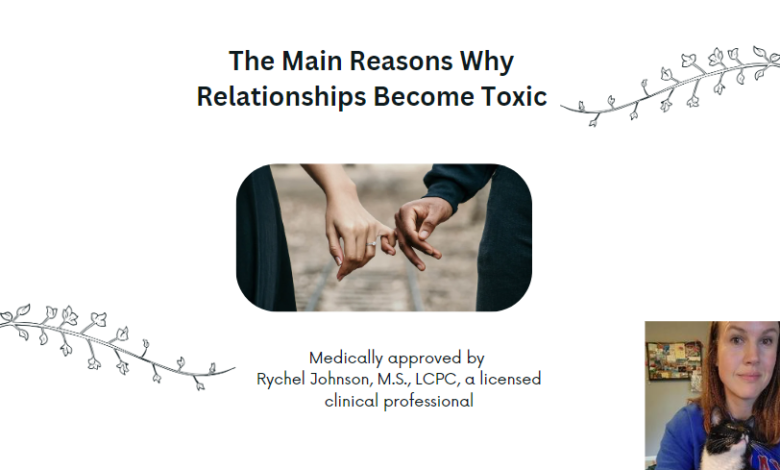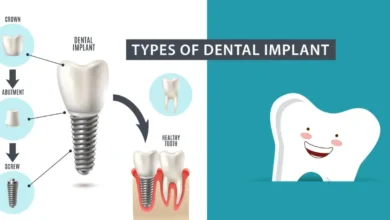The Main Reasons Why Relationships Become Toxic

Relationships are complex and multifaceted, often serving as sources of joy, support, and growth. However, they can also become toxic, characterized by negativity, conflict, and emotional harm. Understanding the root causes of toxic relationships is essential for fostering healthier connections and promoting personal well-being.
Contents
- 1 Lack of Communication:
- 2 Unresolved Conflict:
- 3 Power Imbalance:
- 4 Lack of Boundaries:
- 5 Trust Issues:
- 6 Codependency:
- 7 Incompatibility:
- 8 Trauma and Unresolved Issues:
- 9 External Stressors:
- 10 Lack of Self-Awareness:
- 11 Recognize and Acknowledge Toxic Patterns:
- 12 Open and Honest Communication:
- 13 Set Boundaries:
- 14 Seek Professional Help:
- 15 Address Underlying Issues:
- 16 Practice Empathy and Compassion:
- 17 Take Responsibility and Apologize:
- 18 Focus on Solutions, Not Blame:
- 19 Practice Self-Care:
- 20 Evaluate Progress and Adjust as Needed:
- 21 Conclusion:
Lack of Communication:
- Effective communication is the cornerstone of any healthy relationship. When communication breaks down or becomes strained, misunderstandings, resentment, and conflicts can arise. Toxic relationships often feature communication patterns marked by defensiveness, criticism, contempt, and stonewalling.
Unresolved Conflict:
- Conflict is inevitable in relationships, but how it is managed can determine whether a relationship becomes toxic. Avoiding or escalating conflict without resolution can lead to resentment and erode trust and intimacy between partners.
Power Imbalance:
- In some relationships, one partner may exert disproportionate control or power over another. This power imbalance can manifest in various forms, such as manipulation, coercion, or emotional abuse, leading to feelings of helplessness and dependency in the victimized partner.
Lack of Boundaries:
- Healthy boundaries are essential for maintaining individual autonomy, self-respect, and mutual respect within relationships. When boundaries are unclear or violated, individuals may feel suffocated, disrespected, or exploited, contributing to feelings of resentment and toxicity.
Trust Issues:
- Trust forms the foundation of solid and lasting relationships. It can be challenging to rebuild when trust is broken through dishonesty, betrayal, or infidelity. Lingering trust issues can perpetuate toxic dynamics characterized by suspicion, insecurity, and jealousy.
Codependency:
- Codependent relationships are characterized by excessive emotional reliance on a partner, often to the detriment of one’s well-being. In codependent dynamics, individuals may sacrifice their needs, boundaries, and autonomy to maintain the relationship, leading to resentment, enabling behaviour, and emotional enmeshment.
Incompatibility:
- Despite shared values and mutual affection, some relationships may be incompatible due to differences in personality, goals, or lifestyles. Incompatibility can lead to chronic dissatisfaction, frustration, and resentment, fostering toxic dynamics characterized by conflict and emotional distress.
Trauma and Unresolved Issues:
- Past trauma, unresolved emotional wounds, and unaddressed mental health issues can significantly impact relationship dynamics. Individuals may project their unresolved issues onto their partners, leading to conflicts, triggers, and emotional volatility.
External Stressors:
- External stressors such as financial difficulties, work-related stress, or family conflicts can strain relationships and contribute to toxicity. When partners are overwhelmed by external pressures, they may struggle to communicate effectively, support each other, or maintain intimacy.
Lack of Self-Awareness:
- Individuals who lack self-awareness or emotional intelligence may inadvertently contribute to toxic relationship dynamics through their behaviours, attitudes, or unresolved issues. Without self-reflection and personal growth, these patterns may persist and worsen over time.
Fixing a toxic relationship requires both partners’ commitment, effort, and willingness to address underlying issues and cultivate healthier dynamics. Here are some steps on how to fix a toxic relationship:
Recognize and Acknowledge Toxic Patterns:
- Both partners need to acknowledge the toxic behaviours, communication patterns, and dynamics present in the relationship. This requires honest self-reflection and a willingness to take responsibility for one’s actions.
Open and Honest Communication:
- Effective communication is crucial for resolving conflicts and rebuilding trust. Create a safe space where both partners can express their feelings, concerns, and needs without fear of judgment or reprisal. Listen actively and empathetically to each other’s perspectives.
Set Boundaries:
- Establish clear and healthy boundaries to protect your emotional well-being and maintain mutual respect within the relationship. Boundaries define acceptable behaviour, personal space, and individual autonomy. Respect each other’s boundaries and communicate openly about your needs and limits.
Seek Professional Help:
- Consider seeking guidance from a couples therapist or counsellor specializing in relationship issues. A trained professional can provide objective insights, teach communication skills, and facilitate constructive dialogue to address underlying issues.
Address Underlying Issues:
- Explore and address any underlying issues contributing to the relationship’s toxicity, such as unresolved conflicts, past traumas, or individual insecurities. Work together to identify and understand these root causes and support each other in healing and personal growth.
Practice Empathy and Compassion:
- Cultivate empathy and compassion for each other’s experiences, feelings, and perspectives. Try to understand where your partner is coming from and validate their emotions, even if you disagree with their viewpoint. Empathetic listening fosters connection and mutual understanding.
Take Responsibility and Apologize:
- Take ownership of your mistakes, apologize sincerely, and commit to making positive changes. Acknowledge the impact of your actions on your partner and express genuine remorse. Avoid blaming or criticizing your partner and focus on rebuilding trust and repairing the relationship.
Focus on Solutions, Not Blame:
- Instead of dwelling on past grievances or assigning blame, focus on finding constructive solutions to the issues at hand. Collaborate with your partner to identify practical strategies and compromises that promote mutual growth and happiness.
Practice Self-Care:
- Prioritize self-care and individual well-being to strengthen your emotional resilience and ability to navigate relationship challenges. Engage in activities that bring joy, reduce stress, and promote personal growth. Remember that caring for yourself enables you to show up as a better partner.
Evaluate Progress and Adjust as Needed:
- Assess your progress in repairing the relationship regularly and proactively address any setbacks or recurring issues. Be patient and compassionate with yourselves as you navigate the healing process, and remain committed to supporting each other’s growth and happiness.
Conclusion:
Toxic relationships can have detrimental effects on individuals’ mental, emotional, and physical well-being. Typically, anxiety and nausea may also occur. Individuals can take proactive steps to cultivate healthier, more fulfilling relationships by recognizing and addressing the underlying reasons for toxicity. Through effective communication, boundary-setting, conflict resolution, and self-reflection, individuals can navigate relationship challenges and foster greater harmony, respect, and mutual support.



